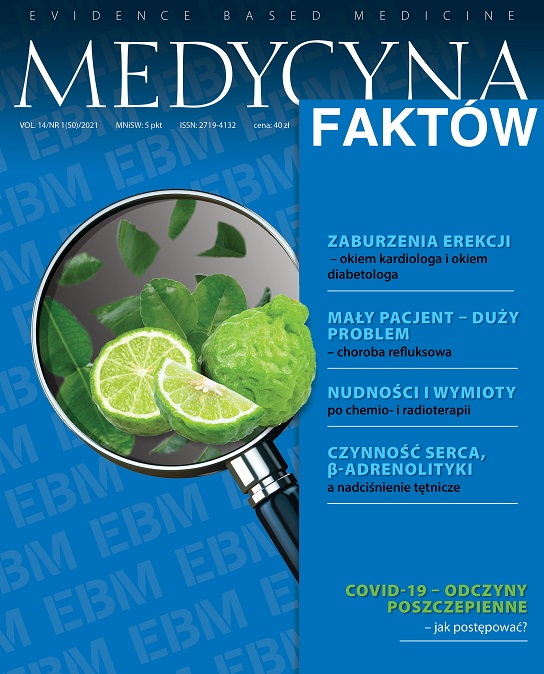Adverse reactions to COVID-19 vaccine – how to treat? Review article
Main Article Content
Abstract
We do not have an effective medicine for COVID-19, and we only have symptomatic treatment. The best treatment is prophylaxis, which in infectious diseases is based on vaccinations. Years of using vaccinations have led to the disappearance or significant reduction of infectious diseases. Currently, in Poland, we have three vaccines against COVID-19: two mRNA (Comirnaty by Pfizer/BioNTech and Moderna COVID-19 vaccine) and vector vaccines (COVID-19 Vaccine AstraZeneca). Vaccines are highly effective in protecting against the onset of COVID-19 symptoms in large clinical trials. Vaccines can cause adverse vaccine reactions (any vaccine-related medical condition that has occurred within 4 weeks of vaccination). Studies show that adverse vaccine reactions after the COVID-19 vaccine occurs in about 0.03–0.2% of the vaccinated. The most common adverse reactions were injection site pain (> 80%), fatigue (> 60%), headache (> 50%), myalgia (> 30%), chills (> 30%), arthralgia (> 20%) fever (> 10%), usually mild or moderate, subsiding in a few days. Adverse reactions should be treated with painkillers and antipyretics – paracetamol and ibuprofen. Both paracetamol and ibuprofen are well researched preparations, with high safety and effectiveness. The antipyretic and analgesic effect of both drugs is similar. The condition for a good effect is the use of an appropriate, recommended dosage. Now paracetamol appears to be the drug of first choice for the treatment of pain and fever following COVID-19 vaccination. However, knowledge about immunization and vaccines is growing steadily and recommendations are changing. We need to follow up-to-date information and adapt our activities to changing medical knowledge.
Article Details
Copyright © by Medical Education. All rights reserved.
References
2. Pande RK, Bhalla A, Myatra SN et al. Procedures in COVID-19 Patients: Part-I. Indian J Crit Care Med. 2020; 24(suppl 5): S263-S71.
3. Polack FP, Thomas SJ, Kitchin N et al. Safety and Efficacy of the BNT162b2 mRNA Covid-19 Vaccine. N Engl J Med. 2020; 383(27): 2603-15.
4. Baden LR, El Sahly HM, Brandon Essink B et al. Efficacy and Safety of the mRNA-1273 SARS-CoV-2 Vaccine. N Engl J Med. 2021; 384(5): 403-16.
5. Ledford H. Moderna COVID vaccine becomes second to get US authorization. Nature. 2020. http://doi.org/10.1038/d41586-020-03593-7.
6. Voysey M, Clemens SAC, Madhi SA et al. Safety and efficacy of the ChAdOx1 nCoV-19 vaccine (AZD1222) against SARS-CoV-2: an interim analysis of four randomised controlled trials in Brazil, South Africa, and the UK. Lancet. 2020; S0140-6736(20): 32661-1.
7. Czym jest niepożądany odczyn poszczepienny? (access: 17.02.2021).
8. Rozporządzenie Ministra Zdrowia z dnia 31 grudnia 2020 roku zmieniające rozporządzenie w sprawie niepożądanych odczynów poszczepiennych oraz kryteriów ich rozpoznawania (Dz.U. 2020 r. poz. 13).
9. NOP – niepożądany odczyn poszczepienny. Czym jest i jak często występuje? (access: 18.02.2021).
10. Covid-19 Tracker. Bloomberg (access: 18.02.2021).
11. Klimek L, Jutel M, Akdis CA et al. ARIA-EAACI statement on severe allergic reactions to COVID-19 vaccines – an EAACI-ARIA position paper. Allergy. 2020. http://doi.org/10.1111/all.14726.
12. Su JR, Moro PL, Ng CS et al. Anaphylaxis after vaccination reported to the Vaccine Adverse Event Reporting System, 1990-2016. J Allergy Clin Immunol. 2019; 143(4): 1465-73.
13. Ściubisz M, Mrukowicz J. Co aktualnie wiemy z nadzoru nad bezpieczeństwem szczepionek przeciwko COVID-19 (stan na 10.02.2021)? Med Prakt. 2021 (access: 17.02.2021).
14. Rekomendacje Zespołu Ekspertów pod kierunkiem Konsultanta Krajowego w dziedzinie Alergologii dotyczące szczepienia przeciwko COVID-19 szczepionką mRNA (Comirnaty) dla Lekarzy kwalifikujących do szczepienia i dla Konsultantów Alergologów. Warszawa 2020.
15. Prymula R, Siegrist CA, Chlibek R et al. Effect of prophylactic acetaminophen administration at time of vaccination on febrile reactions and antibody responses in children: two open-label, randomised controlled trials. Lancet. 2009; 374(9698): 1339-50.
16. Doedée AM, Boland GJ, Pennings JL et al. Effects of prophylactic and therapeutic acetaminophen treatment during vaccination on hepatitis B antibody levels in adults: two openlabel, randomized controlled trials. PLoS One. 2014; 9(6): e98175.
17. Etminan M, Sodhi M, Ganjizadeh-Zavareh S. Should Antipyretics be used to Relieve Acute Adverse Events Related to COVID-19 Vaccines? Chest. 2021; S0012-3692(21)00254-3. http://doi.org/10.1016/j.chest.2021.01.080.
18. CDC General Best Practice Guidelines for Immunization: Best Practices Guidance of the Advisory Committee on Immunization Practices (ACIP) (access: 17.02.2021).
19. Doniec Z, Jackowska T, Sybilski A et al. GORĄCZKA u dzieci – reKOMendacje PostępowaniA w praktyce lekarza podStawowej opieki zdrowotnej – KOMPAS GORĄCZKA. Fam Med Prim Care Rev. 2021; 23(1). http://doi.org/10.5114/fmpcr.2021.102648.
20. Martino M de, Chiarug A. Recent advances in pediatric use of oral paracetamol in fever and pain management. Pain Ther. 2015; 4: 49-168.

